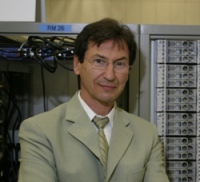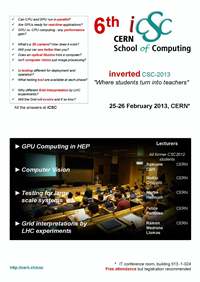iCSC Frequently Asked Questions
|
|
Why an inverted
CSC? |
Because we noted that at regular CSCs, the sum
of the knowledge of the students often exceeds that
of the lecturer teaching at that time, and that it is not
infrequent to find someone in the room who knows more
than the lecturer on a particular aspect. Why not to try and
exploit this? This is the idea behind
iCSC,
which was prototyped in 2005. |
|
Who will provide lectures? |
Only selected
CSC2011 and CSC2012 students. |
|
When and where? |
25-26 February
2013, at CERN, Building 513, Room 513-1-024 (first floor) |
|
Who can attend? |
Anyone interested, attendance is fully free |
|
Should I register? |
This is not mandatory if you work on the CERN
site. But it is recommended: If you do
register, you will
get a hard-copy of the lecture handouts (first registered, first
served). This will also
help us for the logistics. |
|
I am not at CERN, may I attend?
|
Yes as long as
you have some connection to CERN.
-
If you
already
do have CERN access
card, just use it to enter the site.
-
If you have
no CERN access card,
you are expected to provide the name of someone
at CERN (a guarantor) who will vouch for you.
-
Register by email
with the name of your guarantor.
-
After verification with the
guarantor, an access card will
be prepared for you.
-
Failure
to do so will prevent you to
enter the site.
|
|
How is the programme
organized? |
The school lasts
one and a half day. Lectures are logically clustered into
two main themes and two special lectures. |
|
May I attend only one theme? |
Yes of course, attendance is fully free. |
|
May I attend only one or a few lectures? |
Yes.
Lectures, though most of them form a consistent series, are structured to be followed rather independently. Some have more
"fundamentals" components, other tackle more in-depth topics.
However, to avoid disturbing classes, we ask you to not enter or
leave the classroom during lectures. There is always at least a
ten-minute break between any two consecutive lectures, so that
participants can easily come in or quit the classroom between
lectures. |
|
Will there be handouts? |
Yes, a printed version for those who have
registered
(first registered, first served), and web access for the others. |
|
I am a
former CSC2012
student. Anything special
for me?
|
Yes, as a former
CSC2012 student in Uppsala, if you
register,
you are welcome to participate in a
dinner in Restaurant No. 1
on Monday 25 February at 19.00 hours.
If attending the dinner, confirm your participation in
your registration email. |
|
Where does
the programme come from? |
CSC2011 and CSC2012 students interested in contributing in
iCSC-2013
made proposals via an
electronic discussion forum. The
school theme coordinators selected the best / most relevant proposals .
Mentors were then appointed for every lecture,
to review the content and control the quality of the material |
|
Is there a common dominator between themes?
|
Yes, the idea is that the lecturers go one step further than the
tuition delivered at the main CSC, focusing on novel ideas and
technologies. Most of what will be taught at iCSC
has rarely been taught
at CERN before.
|



